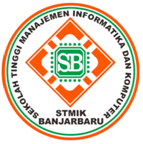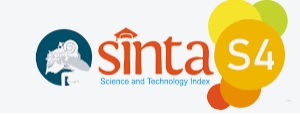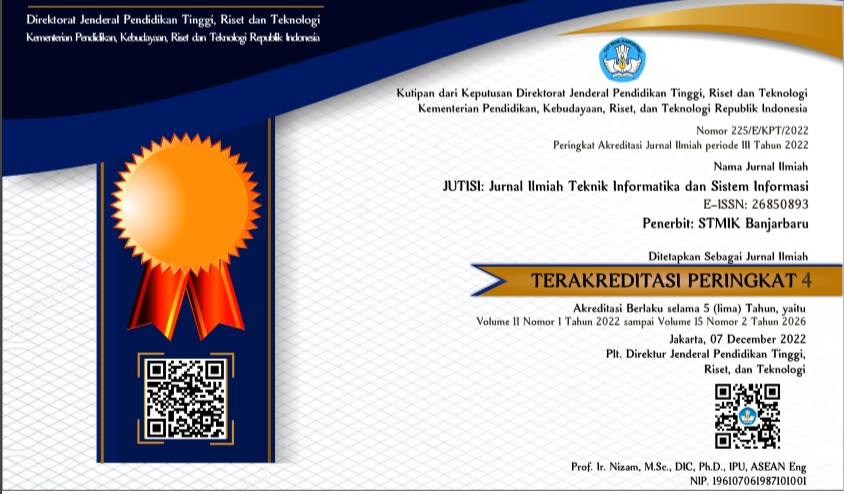Analisis Sentimen Bakal Calon Presiden Indonesia 2024 Dengan Algoritma Naïve Bayes
Abstract
Abstract
Indonesia's current constitutional regulations prohibit a president from running for more than two consecutive terms. Therefore, the presidential election in 2024 will be a very interesting moment, because Jokowi cannot run again. This opens up opportunities for various figures and other political figures to compete and nominate themselves as presidential candidates. Internet residents are also active in expressing their opinions on this matter, one of whom is Twitter user. This opinion from Twitter is used to analyze public sentiment towards presidential candidate figures. This research applies the Naive Bayes algorithm. The hope is that the results of this research can provide insight to the public in the presidential election process in the next presidential election. The conclusion of this research is that the accuracy value is 80% for Ganjar Pranowo, 70.4% for Anies Baswedan, and 75% for Prabowo Subianto. The best Naive Bayes algorithm testing performance is found in the Ganjar Pranowo dataset with an f1-score of 0.88 for the positive class.
Keywords: Presidential Candidates; Figures; Sentiments; Twitter; Naive Bayes.
Â
Abstrak
Peraturan konstitusi Indonesia saat ini melarang seorang presiden untuk mencalonkan diri lebih dari dua periode berturut-turut. Oleh karena itu, pemilihan presiden pada tahun 2024 akan menjadi momen yang sangat menarik, karena presiden Jokowi tidak dapat mencalonkan diri lagi. Hal ini membuka peluang bagi berbagai tokoh dan figur politik lainnya untuk bersaing dan mencalonkan diri sebagai bakal calon presiden. Warga internet juga aktif berpendapat mengenai hal ini, salah satunnya pengguna twitter. Pendapat dari twitter ini digunakan untuk menganalisis sentimen masyarakat terhadap tokoh-tokoh calon presiden. Penelitian ini menerapkan algoritma Naive Bayes. Harapannya, hasil penelitian ini dapat memberikan wawasan kepada masyarakat dalam proses pemilihan presiden pada pemilihan presiden mendatang. Kesimpulan dari penelitian ini mendapatkan nilai akurasi yaitu 80% untuk Calon Presiden Ganjar Pranowo, 70,4% untuk calon presiden Anies Baswedan, dan 75% untuk calon presiden Prabowo Subianto. Performa pengujian Algoritma Naive Bayes terbaik terdapat pada pengujian dataset untuk calon presiden Ganjar Pranowo dengan nilai f1-score sebesar 0,88 untuk kelas positif.
Â
Keywords
References
Pemerintah Indonesia, Undang - Undang Republik Indonesia Nomor 42 Tahun 2008 Tentang Pemilihan Umum Presiden dan Wakil Presiden. Jakarta: Sekertariat Negara, 2008.
E. Safitri, “Zulhas Didorong Nyapres 2024, Survey Membuktikan... ,†detiknews. Accessed: Oct. 01, 2023. [Online]. Available: Baca artikel detiknews, “Zulhas Didorong Nyapres 2024, Survei Membuktikan...†selengkapnya https://news.detik.com/berita/d-5705142/zulhas-didorong-nyapres-2024-survei-membuktikan. Download Apps Detikcom Sekarang https://apps.detik.com/detik/
A. Rifda, “10 Sosial Media Paling Populer di Indonesia,†Gramedia Blog. Accessed: Oct. 01, 2023. [Online]. Available: https://www.gramedia.com/best-seller/sosial-media-paling-populer/
M I. Mahdi, “Pengguna Media Sosial di Indonesia Capai 191 Juta pada 2022,†DataIndonesia. Accessed: Oct. 01, 2023. [Online]. Available: https://dataindonesia.id/ internet/detail/pengguna-media-sosial-di-indonesia-capai-191-juta-pada-2022].
Y. A. Singgalen, “Pemilihan Metode dan Algoritma dalam Analisis Sentimen di Media Sosial: Sistematic Literature Review,†Journal of Information Systems and Informatics, vol. 3, no. 2, pp. 278–302, Jun. 2021, doi: 10.33557/journalisi.v3i2.125.
A. M. Siregar and M. A. Rofik, “Mengukur Tingkat Kepuasan Mahasiswa Dalam Pembelajaran Dengan Naïve Bayes,†Prosiding Konferensi Nasional Penelitian Dan Pengabdian Universitas Buana Perjuangan Karawang, vol. 1, no. 1, pp. 1–19, 2021.
A. Muzaki and A. Witanti, “Sentiment Analysis of The Community in The Twitter To The 2020 Election In Pandemic Covid-19 By Method Naive Bayes Classifier,†Jurnal Teknik Informatika (Jutif), vol. 2, no. 2, pp. 101–107, Mar. 2021, doi: 10.20884/1.jutif.2021.2.2.51.
I. M. M. Parwita and D. Siahaan, “Classification of mobile application reviews using word embedding and convolutional neural network,†Lontar Komput. J. Ilm. Teknol. Inf, vol. 10, no. 1, pp. 1–8, 2019.
A. F. Anees, A. Shaikh, A. Shaikh, and S. Shaikh, “Survey paper on sentiment analysis: Techniques and challenges,†EasyChair2516-2314, 2020.
S. Hikmawan, A. Pardamean, and S. N. Khasanah, “Sentimen Analisis Publik Terhadap Joko Widodo terhadap wabah Covid-19 menggunakan Metode Machine Learning,†Jurnal Kajian Ilmiah, vol. 20, no. 2, pp. 167-176, 2020.
A. Deolika, K. Kusrini, and E. T. Luthfi, “Analisis pembobotan kata pada klasifikasi text mining,†(JurTI) Jurnal Teknologi Informasi, vol. 3, no. 2, pp. 179–184, 2019.
J. J. Aripin, “Penerapan Algoritma Naive Bayes Untuk Mengklasifikasi Data Nasabah Asuransi pada BPR Pantura,†2021.
D. A. Agustina and F. Rahmah, “Analisis Sentimen pada Sosial Media Twitter terhadap MRT Jakarta Menggunakan Machine Learning,†Insearch: Information System Research Journal, vol. 2, no. 01, pp. 1–6, 2022.
S. Juanita, “Analisis Sentimen Persepsi Masyarakat Terhadap Pemilu 2019 Pada Media Sosial Twitter Menggunakan Naive Bayes,†Jurnal Media Informatika Budidarma, vol. 4, no. 3, pp. 552-561, Jul. 2020, doi: 10.30865/mib.v4i3.2140.
A. B. P. Negara, H. Muhardi, and I. M. Putri, “Analisis Sentimen Maskapai Penerbangan Menggunakan Metode Naive Bayes dan Seleksi Fitur Information Gain,†Jurnal Teknologi Informasi dan Ilmu Komputer, vol. 7, no. 3, pp. 599-609, 2020, doi: 10.25126/jtiik.2020711947.
How To Cite This :
Refbacks
- There are currently no refbacks.











